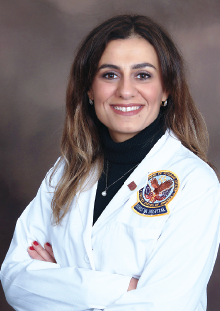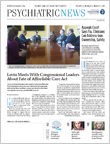Online social networks and discussion groups offer an opportunity for patients with mental illness and substance use disorder to connect with peers, talk about the challenges they commonly share, and learn that they are not alone.
In recent years, a growing number of psychiatrists have also started to come together in online communities to discuss everything from personal tragedies to difficult-to-treat cases.
An online community established by Christina Girgis, M.D., an associate professor of psychiatry at Loyola University Medical Center in Chicago, offers just one example of the many online groups available for psychiatrists.
A couple years ago, after experiencing a stillbirth, Girgis began looking for a women’s support group to find some emotional support. None of the groups had what Girgis was looking for, so instead she reached out to some female colleagues and formed her own private group, which she termed the Women’s Psychiatrist Group.
Girgis told Psychiatric News that she and her friends found their small online network to be valuable in sharing clinical stories, talking about psychiatry in the news, and discussing relevant personal issues like work-life balance.
Through some recruitment and word of mouth, more friends began to join, which soon cascaded into a steady stream of referrals and the rapid, organic growth of the group. Two years later, that private group is still going, and now with nearly 3,000 members.
Hala Sabry, D.O., an emergency medicine physician with CEP Medical Group in California, also turned personal difficulties into an online opportunity. After being unsuccessful in tracking down a physician support group when she was dealing with anxiety and burnout, she decided to forge ahead and create the Physician Moms Group.
The Physician Moms Group, launched in 2014, boasts more than 65,000 members and is similar to Girgis’s group, it provides a forum for women physicians to open up about the challenges of balancing work and family on topics such as children’s school issues, spousal support, and career advice.
Despite the rapid growth, Sabry said she believes her group still feels like a cohesive community, but one that offers a diverse blend of opinions and insight. However, she noted there are advantages to smaller, more focused groups like Girgis’s group, as each offers a different perspective, and physicians, just like their patients, should have a range of options if they are considering joining an online group.
“There are countless support resources available for patients, but physicians have been an underserved population,” Sabry said. “We have been expected to know it all and handle it all, and do it with a smile on our face.”
Social Networks Have Clinical Benefits Too
Women are not the only ones who can benefit from—or are interested in—online networks, as Girgis experienced when several of her group members wondered if their husbands, who were also psychiatrists, could join.
“At that point the group parameters had been established enough that it felt hard to change the membership requirements,” Girgis said.
However, Girgis did create a second group in January 2016 known as the Psychiatry Network, or Psych Net.
Envisioned as more of a professional rather than personal resource, Psych Net was geared as a venue for psychiatry residents and early career psychiatrists to network with peers, find out about job opportunities, and/or learn how to grow and advance in their current job.
Girgis told Psychiatric News that psychiatrists of all levels are welcome at Psych Net, and many established professionals are engaged in that group.
Perhaps one of the most robust conversation topics is case discussion. Girgis has found both networks to be very engaged when there are opportunities to help a colleague with treatment or diagnosis. She did stress to Psychiatric News that patient privacy is taken seriously, and both groups have strict parameters for how people can post clinical questions.
“And it’s been a tremendous help to many of the members, especially psychiatrists in private practice or those right out of residency who no longer have direct supervision or a large in-house peer network.”
Claudia Reardon, M.D., an associate professor of psychiatry at the University of Wisconsin School of Medicine and Public Health, said that she has come to deeply value the information and real-time feedback she has received on clinical questions from these online networks.
“It is a quick and easy way to connect with experts or colleagues and get potentially useful information about patient care,” she said. Since many of these groups are housed within Facebook (or have an accompanying Facebook page), joining and staying connected is easy, she added.
Many of Reardon’s colleagues would seem to agree, for while the Psychiatry Network is just over a year old (and private like the Women’s Psychiatry Group), it has already surpassed 5,000 members. Meanwhile, other tailored networks including groups for psychiatrists in private practice or in reproductive psychiatry have also been springing up.
Although these sites are geared toward physicians, Girgis pointed out that patients likely benefit as well, whether directly through the clinical case discussions or indirectly as physicians use these online groups to better their mind and mood and improve performance. ■
More information on the Physician Moms group can be accessed
here. More information about the Psychiatry Network is available
here).


